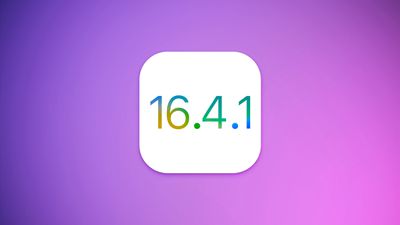Following the launch of iOS 16.5 on May 18, Apple has stopped signing iOS 16.4.1, the previously available version of iOS. Now that iOS 16.4.1 is no longer being signed, iPhone users are prevented from downgrading to that software version.

Apple routinely stops signing older versions of iOS after new releases come out to encourage customers to keep their operating systems up to date, so the fact that iOS 16.4 is no longer being signed is not unusual.
Released on April 7, iOS 16.4.1 was a minor bug fix update that came just under two weeks after the launch of iOS 16.4, an update that introduced new Emoji, Safari Web Push notifications, Voice Isolation for phone calls, and more.
iOS 16.5, the current publicly available version of iOS, brought some important bug fixes and a couple of feature additions, including a dedicated Sports tab in Apple News and a Pride Collection wallpaper for Lock Screens. Apple is also testing iOS 16.6 with developers and public beta testers.















Top Rated Comments
I am extremely stubborn when it comes to UI changes though, and I bet that by the time I am used to all of this they will change it again the next year...
I despise locked down products and subscriptions with a passion, but I'm not sure how we stop it. Even if everyone were to stop buying locked down devices and only bought open devices right now, the overall profit would still be much lower in the long term (and the economists know it), thus the incentive to push people back to subscriptions in any way possible would never go away. Of course in reality a lot of people don't have a choice but to buy service-type devices - the fact that every major software vendor (Adobe, Microsoft, now Apple, etc.) have all moved to subscription software is part of it. Plus there are many kinds of things we do on our devices that depend on a service model - the simplest example is that we need a cellular network to connect our cell phones to, so there will always be a "service" component at play. Every example, even in the OSS world, of someone putting out a fully open device is consistently proven not to be financially viable in the long term, and/or users don't like that they can't use it with their favorite SERVICES (can't watch Netflix at HD quality on open-source Android versions is an example). It will likely not be long before you simply CANNOT buy a device that isn't a subscription-based locked-down service device. (Wasn't Apple talking about moving the iPhone itself to a lease model, where you never actually own the physical phone? That's where I fear we're ultimately heading.)